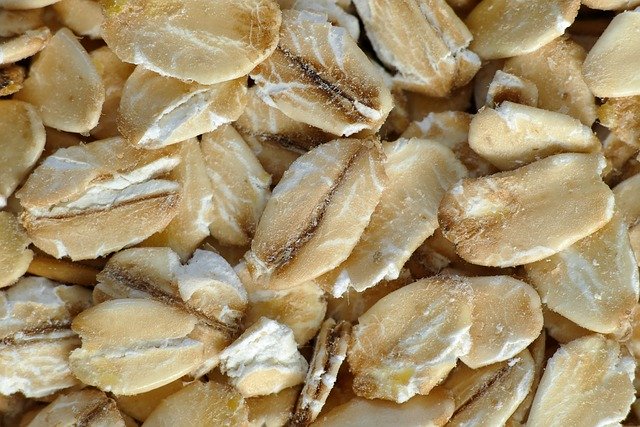Herbs and Spices - Oat

Oat
The oat (Avena sativa), sometimes called the common oat, is a species of cereal grain grown for its seed, which is known by the same name (usually in the plural, unlike other cereals and pseudocereals). While oats are suitable for human consumption as oatmeal and oat milk, one of the most common uses is as livestock feed. Oats are a nutrient-rich food associated with lower blood cholesterol when consumed regularly.
The wild ancestor of Avena sativa and the closely related minor crop, A. byzantina, is the hexaploid wild oat, A. sterilis. Genetic evidence shows the ancestral forms of A. sterilis grew in the Fertile Crescent of the Near East.[2] Oats are usually considered a secondary crop, i.e., derived from a weed of the primary cereal domesticates, then spreading westward into cooler, wetter areas favorable for oats, eventually leading to their domestication in regions of the Middle East and Europe.[2]
Oats are best grown in temperate regions. They have a lower summer heat requirement and greater tolerance of rain than other cereals, such as wheat, rye or barley, so they are particularly important in areas with cool, wet summers, such as Northwest Europe and even Iceland. Oats are an annual plant, and can be planted either in autumn (for late summer harvest) or in the spring (for early autumn harvest).
Benefits:
1. Oats Are Incredibly Nutritious
Oats are rich in carbs and fiber, but also higher in protein and fat than most other grains. They are very high in many vitamins and minerals.
2. Whole Oats Are Rich in Antioxidants, Including Avenanthramides
Oats contain many powerful antioxidants, including avenanthramides. These compounds may help reduce blood pressure and provide other benefits.
3. Oats Contain a Powerful Soluble Fiber Called Beta-Glucan
Oats are high in the soluble fiber beta-glucan, which has numerous benefits. It helps reduce cholesterol and blood sugar levels, promotes healthy gut bacteria and increases feelings of fullness.
4. They Can Lower Cholesterol Levels and Protect LDL Cholesterol From Damage
Oats may lower the risk of heart disease by reducing both total and LDL cholesterol and protecting LDL cholesterol from oxidation.
5. Oats Can Improve Blood Sugar Control
Due to the soluble fiber beta-glucan, oats may improve insulin sensitivity and help lower blood sugar levels.
6. Oatmeal Is Very Filling and May Help You Lose Weight
Oatmeal may help you lose weight by making you feel more full. It does this by slowing down the emptying of the stomach and increasing production of the satiety hormone PYY.
7. Finely Ground Oats May Help With Skin Care
Colloidal oatmeal (finely ground oats) has long been used to help treat dry and itchy skin. It may help relieve symptoms of various skin conditions, including eczema.
8. They May Decrease the Risk of Childhood Asthma
Some research suggests that oats may help prevent asthma in children when fed to young infants.
9. Oats May Help Relieve Constipation
Studies indicate that oat bran can help reduce constipation in elderly individuals, significantly reducing the need to use laxatives.
Serving ways:
• The most popular way is to simply eat oatmeal (porridge) for breakfast.
• To make oatmeal tastier and even more nutritious, you can add cinnamon, fruits, nuts, seeds and/or Greek yogurt.
• Also, oats are often included in baked goods, muesli, granola and bread.